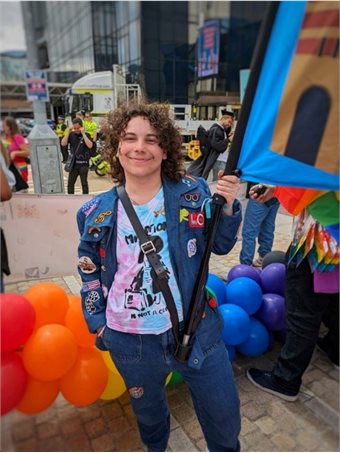Blog: Reflecting on LGBTQ+ Activism
Written by Clem Atkins

Between the Stonewall Riots, daring authors and modern influencers, LGBTQ+ history is filled with inspiring individuals whose visibility and activism has paved the way towards more equitable treatment of our communities. When I think of people who inspire me, many bold individuals come to mind, from Marsha P. Johnson and Sylvia Rivera to Laverne Cox and Billy Porter. In addition to these historical activists and modern celebrity speakers, I think about the importance of activism and community in online spaces, and of the people in my personal life who have helped me embrace my own queer identity.
Activism is powerful and necessary for social change, but often overlooked are the quieter forms of resistance, such as public visibility. When I think of people who inspire me, I stress the importance of having role models who are open about their LGBTQ+ identities. I’ll always remember that around the time I was applying for a PhD in English Literature, some members of my family were coming to accept that I was going to transition my gender but had reservations about how this might affect my application or career. I remember my mother being anxious that these two visions of my future (transitioning and being a professional) might be incompatible. After all, no one in my family had ever heard of an academic who was transgender. She was scared that, after so many years of hard work and tireless studying, discrimination due to my gender identity and sexuality might prevent me from ever being taken seriously in a work environment.
When I tried to get in contact with one of my ex-lecturers for an academic reference, I was initially disappointed to not find their name listed in the staff directory. I browsed the profiles, I realised that over the course of lockdown, my lecturer had transitioned – her eyes immediately recognisable to me but imbued with more happiness than I remembered. This was the first time I had ever personally known an academic who was like me. I think it was an eye-opening moment for my mother, too; she realised that the future I imagined for myself was possible. Just this small moment made my journey a little easier.
It is important for activists to take intersectional approaches to their work – for example, considering race, disability, neurodivergence might intersect with LGBTQ+ identity. Among these intersectional activists, Lyric Rivera (known by their username ‘Neurodivergent Rebel’) summarises themselves as a “GenderFluid, Pansexual, Polyamorous” and works as an “educator, artist, & best-selling author”. For years, I have followed Rivera as they have advocated for the rights and wellbeing for neurodivergent and queer individuals.
Recently, following presidential executive orders to remove DEI (Diversity, Equality and Inclusion) across US institutions, Rivera shared on their Bluesky social media account that they had officially lost their day job as a diversity, equality and inclusion consultant. Regardless, they continue to share resources and calls-to-action with their online following, demonstrating the importance of online forums as places of connection and resistance with a global reach. For myself as a queer and autistic man, these communities act like found families – helping to build bonds and to combat the isolation of our complex lived experiences.
In a world that feels increasingly hostile, sometimes it is enough to simply exist; living an openly queer life is a political act in itself.
Join us in celebrating at UoB by visiting our official LGBTQ+ History Month events page. If you have a story you'd like to share, please reach out to The Student Communications Team by emailing studentcommunications@contacts.bham.ac.uk. We'd love to hear from you!